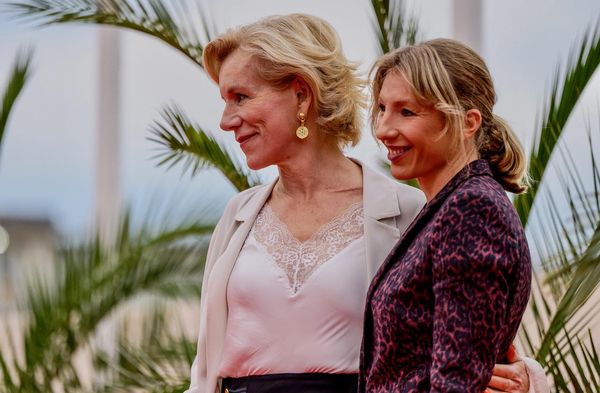The ideal is “never to play yourself” and “always lose yourself in the character.” Over a snatched breakfast at the Grand Hotel in Dinard for the Festival of British and Irish Film where she has been presenting her latest role in Reawakening (directed by second-time filmmaker Virginia Gilbert) she elaborated on her criteria: “As always it was the script - I really loved the script. I have known Virginia for a while and we had talked about another film some years ago but that didn’t happen.
“Then this script arrived - and we had always talked about doing something else - and I loved the words and the idea. It was so nuanced and it is a thriller up to a point.”
The film follows a separated couple who are forced to relive old tensions when their daughter reappears, years after she had vanished as a teenager.
“The question arises about whether she is the girl or is she not the girl. And then there is a twist and it becomes even more interesting. Before committing for me it is always about the whole thing. What is the whole script about and how does it resonate? What does it have to say and is it worth making?
“I also want to ensure that the role offers something new and takes me in a direction I haven’t been before. If it is similar to a lot of things I have done previously then I will say No. It is dangerous to keep on repeating the same thing.”
It’s also about the company she keeps. She had not worked before with Jared Harris and found the prospect intriguing - “he was great to play against.” As for Erin Doherty who plays the returning daughter (or is she?) she had seen her in a play some four years before and remembered her performance then as “absolutely fantastic.”
“Jared, however, was very open and that is the way I like to work too and so it was with Erin. We would sneak off to rehearse on set every morning and Virginia managed to keep the director of photography away long enough to allow us to do that.”
Stevenson appreciates being given firm direction as long as she trusts the person giving the instructions. “I always say to people ‘Please treat me as if I am straight out of drama school.’ I think if you don’t say that at the outset then some directors are scared to direct you. They think she must know what she is doing but that makes me slightly nervous.
“You are never going to get any better if you are always self-reliant. I love being directed in the right way and I have always adored being pushed out of my comfort zone.”
Gilbert professed in one interview that “the gods of film were smiling on us” when it came to casting. Doherty was first come on board followed swiftly by Stevenson with whom she had wanted to work for years. She was quoted as saying “She’s one of our great actors and I knew she would bring total depth and rootedness to a psychologically complex and challenging role.” Harris was the last to read the script, she recalled, “but he read very fast and after a conversation agreed to play the role.” Both Gilbert and Stevenson were impressed by how ciné literate audiences were at the Dinard Festival during question and answer sessions and even impromptu emotional responses from passers-by in the street who had seen the film and recognised them.
 |
| Juliet Stevenson and director Virginia Gilbert greet the crowds at the Dinard Festival of British and Irish Film Photo: Sébastien Guillemois |
She found many points of similarity between that film and the Reawakening including the themes of loss and relationships. She looks back fondly on the connections forged on Truly, Madly, Deeply which were enduring, particularly her friendship with the late Alan Rickman whom she regarded as “a big brother,” always looking out of her.
When she graduated from boarding school at 15, Stevenson was all set to enter college to study English literature and drama. Before leaving for university, however, she changed her mind, realising that lurking with her was a vocation for acting.
She auditioned at Royal Academy of Dramatic Arts in London in 1975 and found herself as part of that year’s intake. She wasn’t entirely happy with the Academy’s emphasis on “process” and was soon widening her orbit with an audition for the Royal Shakespeare Company in 1978 where the formidable panel of inquisitors included actor Ian McKellen and director Trevor Nunn. She spent the next eight years in their ranks before Minghella offered the chance of film work.
Despite a seemingly unending stream of theatre, television series (The Long Call, Wolf) and film roles as well as a continuing foray into the world of audio books she’s currently workshopping a new production for next year’s season at the National Theatre (the final one for outgoing artistic director Rufus Norris). She takes a leading role in David Lan’s new play The Land of the Living, directed by Stephen Daldry which tells of displaced children after the Second World War.
Along with such contemporaries as Fiona Shaw and Emma Thompson, Stevenson, who turns 68 at the end of the month, exudes an irrepressible staying power which shows no sign of longevity fatigue any time soon.
Reawakening now on release in the UK and Ireland.























